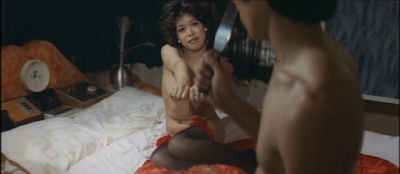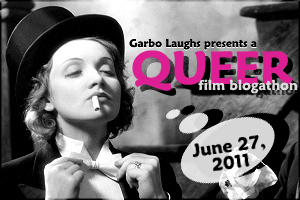There's a helpful and informative documentary on Mondo Macabro's DVD for the Nikkatsu violent pink film, Assault! Jack the Ripper (1976, directed by Yasuhara Hasebe) that explains some of the thought behind a major Japanese studio turning first to soft core porn, and then to more violent roughies in the 1970s. It was an act of desperation as the old studio model for filmmaking collapsed, of course, but it doesn't really explain the perversity of the product that resulted. There's something latent in Japanese culture--some virulent misogyny--that fuels the imagery in this film, at least. For the most part, I'm not even sure how to write about this movie.

A friend of mine once asked me if all Japanese films were about rape. "Of course they aren't," I said. It's films like Assault! Jack the Ripper that are responsible for that reputation. When I recounted this conversation in reference to this movie, one of my correspondents asked me "as a woman, how do you find rape in exploitation, pinku or otherwise?" This is how I answered:
Y'know, it depends on the context and it depends on the way it's filmed. A LOT of rape scenes are filmed in such a way that they might be titillating to some audiences. A friend of mine had this very problem with the rape scene at the center of The Girl with the Dragon Tattoo, for example. She thought there was a certain amount of "posing" and while I'll defend the movie, she's certainly right to assume that someone is going to get off on that scene (someone that I certainly never want to meet, by the way). Some depictions go the other direction. The rape scene in The Accused is almost unendurable.
Intellectually, I have a serious problem with the whole rape/revenge subgenre, but viscerally, I respond to it. Ms.45 and the Female Convict Scorpion movies are particular favorites of mine, and rape is central to them. I should note, however, that I am not a rape survivor, so I don't carry that particular baggage around with me. I do not suffer from rape-related triggers. I'm also conscious of the fact that some women have rape fantasies and that they sometimes act them out via consensual BDSM play. It's a thorny set of issues, one that I'm not entirely equipped to deal with.
That all said, I think the depiction of rape in movies is almost universally presented with a male gaze, which is very problematic, and that this is especially true in Japan. My primary objection to something like Assault! Jack the Ripper isn't that there's rape involved, per se. If the movie was honest about its exploration of its specific sexual pathology, that would be fine (unfortunately, it's not). My objection, rather, is that the movie encourages the viewer to get behind the eyes of its rapist and, in the end, when he has dispatched his partner in crime, it encourages the audience to think, "about time he got rid of that whiny bitch." Additionally, there are no consequences. He gets away scott free. When the credits rolled, I was kind of pissed. But then, I have to remember that Japan is a culture that produced "Rapeman" manga, in which the title character goes around putting women "in their place." There's an element of this in Assault!, too, given the protagonist's predilection for stabbing women in their vaginas. It's like the movie is punishing women for their sex.
It's hard for me to dismiss rape culture in the movies, especially when one friend of mine works as a rape crisis first-responder and when at least three of the other women in my life are rape survivors. But it's equally hard for me to say it should be out of bounds, because it does express something nasty in our culture's collective unconscious that we probably need to examine.
In any event, the movie itself has a certain amount of high gloss sheen. Director Yasuhara Hasebe is a competent and occasionally stylish director, although he's as clueless about the misogyny he puts on screen in this film as he is in the fourth Female Convict Scorpion movie. He just doesn't get it. The movie itself is an interesting conflation of the cases of the Honeymoon Killers and Richard Speck (during the film's insane climax, I kept hearing Divine in my head screaming "I blew Richard Speck!"). Hasebe's brief from the studio required that there be nudity every ten minutes (at the reel changes, in other words), and he certainly delivers on that requirement). This isn't outright porn--none of the roman pinku films, or their violent cousins are outright porn; the censorship laws in Japan guarantee that much--but it is certainly designed for a porn audience.

The plot follows a pastry chef and a waitress who accidentally kill an insane female hitchhiker and, in the process, discover that murder is an aphrodisiac for them. They try it out on one of their bitchier (from their perspective) customers, and, lo and behold, that's what really gets them off. Unfortunately for the female half of our pair of psychos, her partner in crime soon develops a taste for murder for its own sake instead of sex. You can see it in the disinterest he shows in the blow job she gives him during a picnic late in the movie. Eventually, he has to cut ties with her (literally), an event that culminates during a murder spree in a dormitory full of nurses. The movie has other visual motifs, mainly surrounding food. It films the act of eating in a pretty disgusted way, as if to equate it as a base urge with both sex and the need to kill. For the most part, the movie's grasp of its characters' psychologies is rudimentary at best.
The frustrating thing to me about this film is that I've seen pinku eiga that manage to navigate the borderlands between art and pornography with a fair amount of success (see, for instance, Go Go Second Time Virgin). Hell, this is visually arresting enough to keep my interest during its 74 minute running time, but it's so wrong headed that after it was over, all I could do was shake my head.
Current Challenge tally:
Total Viewings: 17
First Time Viewings: 17

















No comments:
Post a Comment